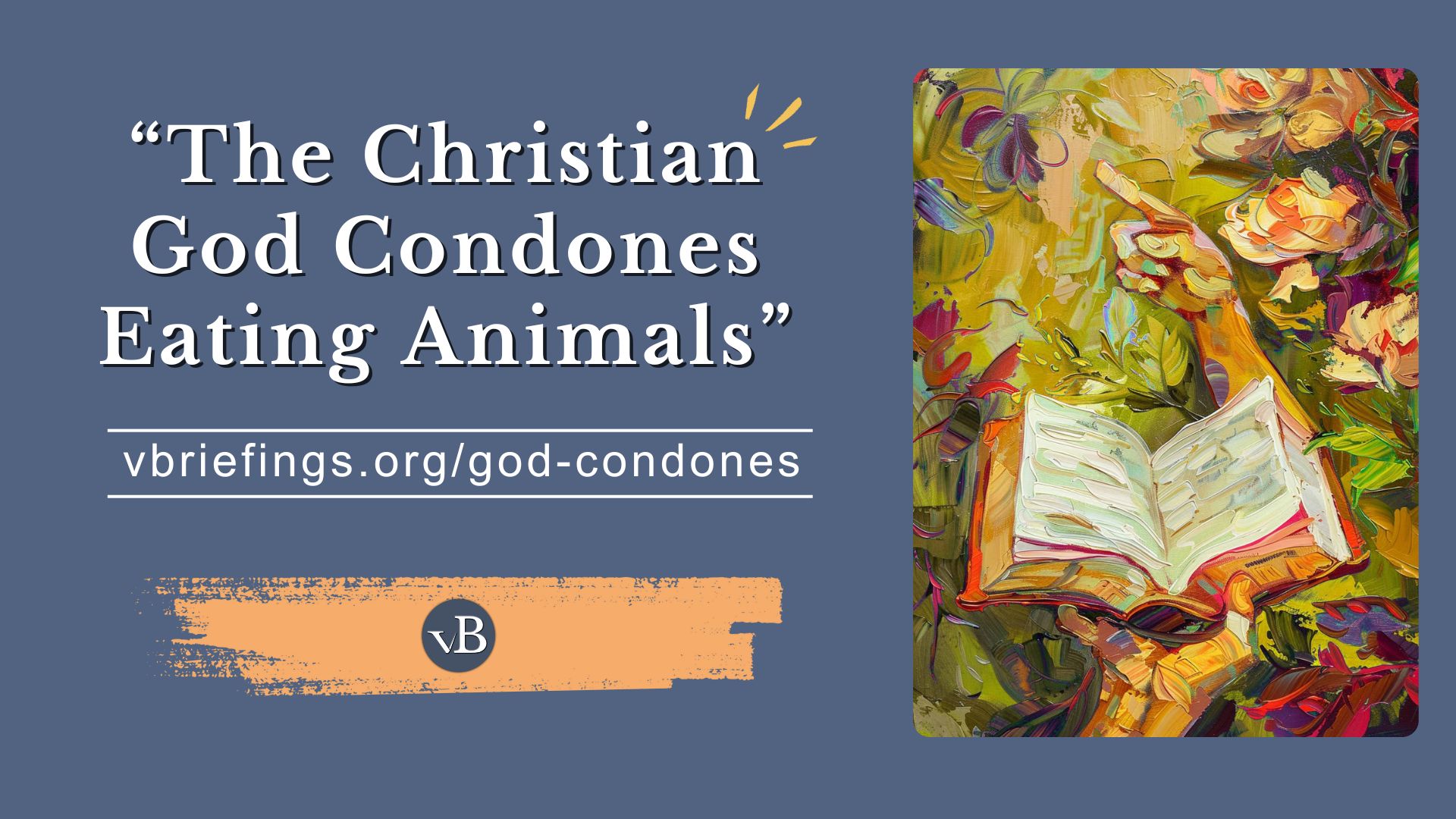Preface
Briefing description and more.
We address the objection to veganism that the Christian God condones the harmful exploitation of animals and even put them here for our use.
Companion Videos
How to use companion videos
Videos may be posted on multiple social media platforms, and you can share them on each platform according each platform’s conventions.
Share this Briefing
Social Media Sharing Image
This image will be used when sharing the briefing on a social media platform. You can see all social sharing images in the grid view.

How to share this briefing
Click on the icon for the platform on which you wish to share. What happens next depends on the platform, but generally a popup will appear, letting you add your own text as you share.
Briefing Meta
Metrics
Note: we will publish additional briefings after completing flashcards and presentation slides for selected briefings.
Counts:
| Main Text | |
| Key Points | 7 |
| Counterclaims | 0 |
| Supplementary | 2 |
| Further Study | 6 |
| Footnotes | 10 |
| Media & Advocacy | |
| Advocacy Notes | 8 |
| —Socratic Questions | 10 |
| Flashcards | 0 |
| Presentation Slides | 0 |
| Memes & Infographics | 0 |
| Companion Videos | 0 |
Other Meta:
Date Posted:
Last Edited:
Edit Log:
Key Points Links
Loading…
Help Us Improve
Please send your suggestions for improvements, or report any issues with this briefing to team@vbriefings.org
We appreciate that you are taking the time to help up improve. All suggestions and reports will be carefully considered.
Summary
A concise summary of the briefing (see below for citations).
Note: This briefing provides a Christian perspective as Christianity is the predominant religion in the countries of most of our readers. See the Further Study Section for Christian, Jewish, and Muslim initiatives supporting veganism and vegetarianism.
The relationship between Christianity (and other religions) and animal ethics is complex, with religious texts presenting conflicting views on dominion and compassion. Even so, the Bible does not mandate eating animal products, leaving the choice up to us. Also, historical dietary limitations differ greatly from today’s abundance, and just as other biblical practices have been reconsidered, so too could animal consumption. Some scholars even argue that biblical ethics ultimately support vegetarianism.
Context
Places this topic in its larger context.
The idea that God condones exploiting animals has long been debated. Religious texts are often contradictory in their teachings on our relationship with other animals, leaving interpretations wide open to either side of the issue.
Religious texts sometimes reinforce the concept of human exceptionalism over other animals as a justification for exploitation and cruelty.1 At the same time, industrialization and large-scale agriculture have further distanced humans from the animals they consume.
Key Points
This section provides talking points.
Because the Bible does not require us to eat animal products, we are each free to follow our own conscience.
Even the conservative Christian group Focus on the Family, which supports both a literal and figurative interpretation of the Bible,2 says that “the New Testament makes it abundantly clear that followers of Jesus are free to follow the dictates of their conscience when it comes to matters of dietary regimen.”3 Focus on the Family also states that the idea that “vegetarianism was part of God’s original purpose and plan for both man and the animals” is “not an unreasonable assumption.”4
You would be hard-pressed to find a Christian scholar, philosopher, or cleric who believes that God requires us to eat animal products. If such people exist, they are outliers.5
Times were different then.
The Bible was likely written between 1900 BCE and 100 CE, with much of the text centered around people living in the desert or semi-arid lands.6
The people in those times and places most likely did not have available to them the abundance of fruits, vegetables, nuts, seeds, legumes, and grains that most of us enjoy today. Nor did they have the science we now have that clearly shows we do not need to eat the flesh of animals or products that come from animals to be healthy.
It is not our intention to judge harshly the dietary choices of those whose circumstances differ from our own in the availability of foods or knowledge of nutrition, but for people today to use circumstances of a time or place entirely removed from them as a rationalization for making choices that result in unnecessary suffering seems, at a minimum, unjustified.
The Bible seems to condone many practices that we no longer deem acceptable.
It’s not difficult to find passages in the Bible that seem to support slavery, the subjugation of women, death for adulterers, and many other practices we now renounce,7 but Bible scholars have hermeneutically rejected the idea that Christianity is compatible with such beliefs.
The interpretation of the Bible’s stance on eating animal products can be viewed through a similar lens, as these practices were shaped by the cultural and historical context of the time.
The word dominion carries the obligations of stewardship and responsibility and doesn’t connote permission to eat.
According to Genesis 1:26 (King James Version), “God said, Let us make man in our image, after our likeness: and let them have dominion over the fish of the sea, and over the fowl of the air, and over the cattle, and over all the earth, and over every creeping thing that creepeth upon the earth.”
Some believe Genesis 1:26 gives us permission to do whatever we wish to animals and the environment. But many Bible scholars believe that the word dominion, in the context of this Bible verse and in its original Hebrew meaning, carries with it the obligations of stewardship and responsibility.8
Today’s animal agriculture industry, it could be argued, is the opposite of stewardship and responsibility, both in its disregard for the lives and suffering of animals and its environmental destruction.
The King James Version of the Bible repeatedly uses “dominion” for kings and rulers in relation to their subjects (see Psalms 72:8, 1 Kings 4:24, and Daniel 7:14), but that would not mean the Bible condones rulers eating their subjects.
The Bible does not necessarily support the notion that animals were put here for us to eat.
In Genesis 1:29 (King James Version), God states that he gave humans plants to eat as food, with no mention of consuming animals. Since, according to the biblical timeline, animals had already been created when this statement was made, it is difficult to argue that the Bible explicitly supports the notion that God intended animals to be used as food for humans.
Some believe the Bible presents the vegan diet as an ideal.
Using Genesis 1:29, it could be argued from the Bible that God’s original plan was for leaving animals off the plate.
Genesis 1:29 (King James Version), which is before the fall, states that “God said, Behold, I have given you every herb bearing seed, which is upon the face of all the earth, and every tree, in which is the fruit of a tree yielding seed; to you it shall be for meat.”
Perhaps Isaiah 11:6–9 (King James Version) foresees a return to a meatless diet in depicting a world where carnivores coexist peacefully with herbivores, saying that “they shall not hurt nor destroy in all my holy mountain.” Wolves and lambs, leopards and goats, and calves and lions shall lie down with each other, and “the lion shall eat straw like the ox.”
There are Bible scholars who believe the Bible directly supports vegetarianism.
Although you would be hard pressed to find a Bible scholar who believes the Bible requires we eat animal products, it’s not difficult to find Bible scholars who believe that the Bible directly supports abstaining from animal products.
In his book Is God a Vegetarian?: Christianity, Vegetarianism, and Animal Rights, Richard Allan Young, who teaches the New Testament at Temple Baptist Seminary, uses biblical ethics to make an argument for vegetarianism.9
Counterclaims
Responses to some yes but retorts.
Counterclaims are often not included in objection-type briefings because the objection itself functions as a form of counterargument.
Supplementary Info
Additional information that may prove useful.
Quotes
- “A Christian vision of delighting in God’s world and living responsibly among the fellow creatures God loves will be an inspiration to many Christians either to adopt a vegan diet, or to move in that direction…” The Vegan Society10
- “And God said, Behold, I have given you every herb bearing seed, which is upon the face of all the earth, and every tree, in the which is the fruit of a tree yielding seed; to you it shall be for meat.” Genesis 1:29 Bible—King James Version
Further Study
Sources providing a deeper understanding of the topic or related topics.
Other Resources
In “Should Christians be vegan?” David Clough argues they have strong faith-based reasons to reduce or eliminate animal products in their diet.
The Wikipedia article on Christian vegetarianism discusses the practice and theological reasoning behind Christians adopting vegetarian or vegan lifestyles, examining biblical interpretations, historical perspectives, and ethical considerations within the context of Christianity.
The following organizations from varying religions may shed additional light on the topic:
Advocacy Resources
Information to help with outreach and advocacy.
Note: we will publish additional briefings after completing flashcards and presentation slides for selected briefings.
Share This Briefing
Cloned from the Preface Section on page load.
Companion Videos
Cloned from the Preface Section on page load.
Memes and Infographics
No images found.
How to use Memes and Infographics
To sequence through all memes and infographics on this page, click on any image than use the arrow keys or the arrow buttons to show next and previous images.
To share a meme or infographic, right click on the image and choose download or save as. Then upload the image to the platform of choice.
Presentation Slides
Slides not available.
How to Use the Presentation Slides
You can view the slideshow full screen by clicking on the first link above.
To use Canva presenter mode, view the speaker notes, or download the slides as PowerPoint, login to Canva (the free account works) and follow the Full Canva Link provided above.
To copy this presentation to your own Canva project, use the Full Canva Link provided above, then select File->Make a Copy from the upper left. You can build your own unique presentation from multiple briefings by copying the presentation from each briefing and then building another presentation from the copied presentations.
Flash Cards
We partner with Brainscape because of their excellent features for learning. You will need to create a free Brainscape account to study the cards.
Go to Flash Cards: This will take you to a list of decks.
About Flash Cards and Brainscape
Flash cards are here to help you commit important facts and concepts in this briefing to memory.
In Brainscape, there is one deck for each briefing. You can study more than one deck at a time. Brainscape uses spaced repetition to promote memory retention. It is “the secret to learning more while studying less.”
You can study using your browser, but Brainscape also has a free mobile app that makes learning anywhere easy.
Socratic Questions
Socratic-style questions are embedded in the Advocacy Notes below, and shown in italics.
These are open-ended, thought-provoking questions designed to encourage critical thinking, self-reflection, and deeper understanding. They are inspired by the Socratic method, a teaching technique attributed to the ancient Greek philosopher Socrates, who would ask his students probing questions rather than directly providing answers.
The goal is to help people examine their beliefs, clarify their thoughts, uncover assumptions, and explore the evidence and reasoning behind their ideas.
Advocacy Notes
Tips for Advocacy and Outreach
Note: These tips take a Christian perspective, as Christianity is the predominant religion in the countries of most of our readers.
General Tips
It is not productive to challenge one’s religious beliefs during conversations on veganism and ethics.
Emphasize the overarching themes of compassion, stewardship, and care for creation align more closely with a plant-based lifestyle,
As always, aim to steer the conversation back to animal injustices and suffering as soon as the flow of the discussion allows.
Remember, your goal isn’t to challenge their faith but to show that religious texts do not mandate animal consumption and that a compassionate, plant-based lifestyle is compatible with—if not encouraged by—their beliefs.
Segue the Conversation Back to Animal Ethics
- “If we can live healthily and compassionately without harming animals, what reason remains to continue eating them?”
- “If Jesus taught love, mercy, and compassion, wouldn’t he want us to extend those values to all of God’s creatures?”
- “Would a God of love and mercy be pleased with the way animals are treated in today’s food system?”
- Proverbs 12:10 says, ‘The righteous care for the needs of their animals.’ How does factory farming, where animals are confined, mutilated, and slaughtered, align with that?”
Why? It’s good to get back to animal ethics as soon as possible.
Emphasize That the Bible Does Not Require Eating Animals
Make it clear that eating animals is a choice, not a commandment.
- “Even conservative Christian groups like Focus on the Family acknowledge that the New Testament gives followers the freedom to choose their diet based on their conscience.”
- “If God required us to eat animal products, you’d expect Christian scholars to teach this, but you would be hard-pressed to find any who do.”
Why? This shifts the conversation from whether eating animals is allowed to whether it is necessary or justified.
Point Out That Biblical Dietary Practices Reflect Their Time, Not Today
Show that historical context matters.
- “The Bible was written in a time when food options were limited, and survival was uncertain. Today, we have access to abundant plant-based foods and knowledge of nutrition, so why rely on outdated survival practices?”
- “Would we say that because the Bible mentions slavery, arranged marriages, or capital punishment for adultery, we should follow those practices today?”
Why? This highlights that we don’t base modern morality on everything in ancient texts—so why selectively do so with diet?
Address the Dominion Argument by Highlighting Stewardship
Some interpret Genesis 1:26 (“Let them have dominion…”) as permission to use animals however we please. Clarify that dominion means responsibility, not exploitation.
- “Biblical scholars point out that ‘dominion’ in its original Hebrew meaning implies stewardship and care, not dominance and cruelty.”
- “If dominion meant doing whatever we wanted to animals, wouldn’t that contradict the biblical principles of mercy and compassion?”
Why? This reframes the conversation so that they must defend exploitation, rather than assuming dominion justifies it.
Footnotes
Our sources, with links back to where they are used.
- Jamison, Wes. “Thy (Animal) Kingdom Come, Our Will Be Done – Christian Research Institute.” Christian Research Institute. 3 July 2015. Accessed January 20, 2025. ↩︎
- Velarde, Robert.“How Do I Interpret the Bible?” Focus on the Family. January 1, 2009. Accessed January 20, 2025 ↩︎
- “Vegans, Vegetarians, and the Bible.” Focus on the Family. August 9, 2012. Accessed January 20, 2025. ↩︎
- “Vegans, Vegetarians, and the Bible.” Focus on the Family. August 9, 2012. Accessed January 20, 2025. ↩︎
- The author tried and failed to find such a scholar ↩︎
- Krentz, Patrick. “When Was the Bible Written?” The International Bible Society. July 28, 2016. Accessed January 20, 2025. ↩︎ ↩︎
- These include 1st Samual 15:2-3, Number 31:17-18, Deuteronomy 13:6-10, 2nd Chronicles. 15:13, Genesis 15:9-10, 1 Samuel 15:2-3, Deuteronomy 22:14-21, Numbers 15:32-36, Leviticus 20:13, Leviticus 25:444-46, Exodus 21:20-21,&7, 1st Peter 2:18, 1st Timothy 2:12, Ephesians 5:22-23, Deuteronomy 20:10-16, Exodus 20:5 ↩︎
- Whelchel, Hugh. “A Biblical View of Dominion: Stewardship.” Tifwe.org, 3 Dec. 2012. Accessed 28 Jan. 2025. ↩︎
- Young, Richard Alan. Is God a Vegetarian?: Christianity, Vegetarianism, and Animal Rights. Open Court, 2012. ↩︎
- “Should Christians Be Vegan?” The Vegan Society. January 25, 2019www.vegansociety.com/news/blog/should-christians-be-vegan. Accessed January 20, 2025 ↩︎




